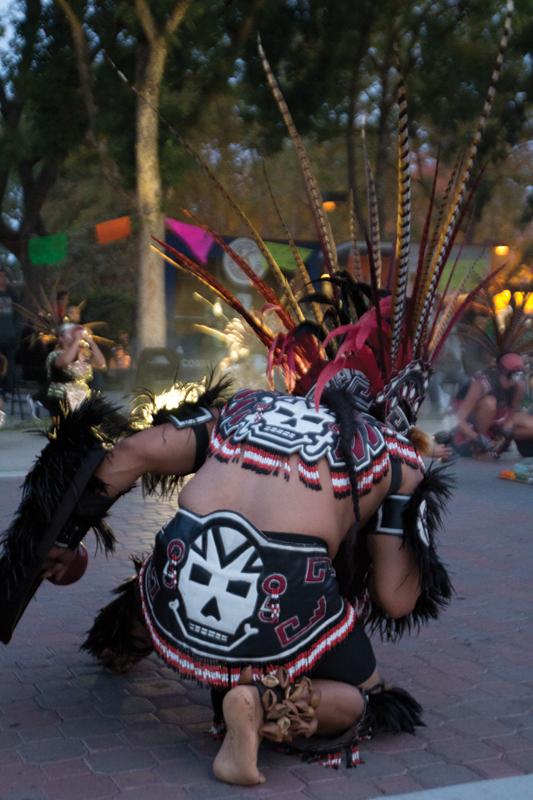
Roe Borunda / The Collegian
Students in skull face paint walked around, incense filled the air, and drums, song and dance broke the typical commotion of the day in the Free Speech area.
Once again, Fresno State welcomed Dia de los Muertos, the Day of the Dead.
For the past several years, the Aztec Dance Club hosted the celebration.
For two days the Free Speech area was dressed in colorful cloth, pictures of lost loved ones and papier-mâché skulls, some bearing grim smiles or decorated in flowers.
Club president Daniel Mejia led the celebrations, which began at 1 p.m. Thursday.
Mejia has been with the dance club for the last four years.
During his first semester at Fresno State, Mejia picked up a flier calling out for new members of the dance group.
Mejia decided to join.
He felt that he needed to learn more about his heritage, and he believed the dance group would be able to do that.
“Dancing is a bridge to connect to my ancestral roots, to that culture and philosophy I wasn’t able to grow up with,” he said.
This is the first year he is serving as club president.
During the celebration, the club brings several performances.
The first to perform was Four Directions, a Native-American powwow group led by Jason Cerritos.
Cerritos and two others played the drum and sang for students, even though the rain forced them to perform under a tent.
The drum, made with the traditional rawhide, is played in ceremonies, where people are allowed to dance. Cerritos said the music is a form of prayer, as well as celebration.
“Our songs are prayers,” he said. “Everything we do like this is a prayer, and we do it for the people and we do it for the ones who can’t.”
The symbol of Four Directions is a four-pointed cross with colored arrows that represent the ethnic groups of the world.
“We think everyone’s equal,” said Ricardo Flores, a powwow performer. “We’re all from the one creator. We’re all one people. We’re all the same”” Humans.”
Fresno State student Luis Sanchez played his collection of traditional flutes on Friday.
“The flute…is an ageless instrument, at least to our people,” Sanchez said.
Sanchez was introduced to the flute when he was 9 years old after his great uncle bought him one of the instruments.
Sanchez said he plays the flute to honor his ancestors and those in his family, like his great uncle, who recently passed away at age 105.
“He was actually the last native-language speaker in our family,” Sanchez said.
The Day of the Dead, Sanchez said, is more than a day for the deceased.
“To us, dancing, music, singing, flute playing is a prayer that we offer to the spirits (and) even the living,” he said.
“It’s also a reminder of our mortality, and through our mortality we are reminded that we have to live life in a joyful manner.”
Sanchez said that dressing fake skulls in garish colors has an important purpose.
“We’re, to a certain extent, mocking death,” he said. “We’re saying, ‘Yeah, we know we’re going to die, but we’re not afraid. We know we’re going to pass, but we’re not afraid.’”
Sanchez played several different flutes for the Friday afternoon crowd. Most instruments drew applause from the crowd, as Sanchez played music rich in Central-American influences.
One, however, drew more nervous glances and soft chuckles.
The Aztec death whistle pierced the air, causing several in the crowd to sit up in surprise.
“This instrument itself was designed to emulate the sound of a dying person,” Sanchez said.
The whistle, Sanchez said, was created solely for Dia de los Muertos.
“That instrument is ugly and it makes a horrible sound, but it’s a reminder that we will die,” he said. “It’s a reminder that there is suffering, but we shouldn’t dwell on it.”
During celebrations, the instrument is an interjecting flute played at random during the music.
Sanchez said that the Aztecs often used the death whistle as they went into battle. The frightening sound would often empty a village of people even before the warriors would arrive.
“A lot of death was actually avoided because of the death whistle,” he said.
Though Sanchez owns many flutes, there’s always one that he never leaves behind.
“I love the sound of the Kiowa flute,” he said. “It’s that really deep, watery sound to it. It’s a real soothing instrument.”
The first day of the celebration featured Juan Santiago, part of the Zapotec Indian group in Fresno, who spoke of the differences and similarities in how Dia de los Muertos is celebrated between the United States and Mexico.
Mejia said his hope is that the celebration will convince others at Fresno State to become more interested in their cultural ancestry.
“Just like how the college level reintroduced me to my cultural roots, this public event is another bridge to those Fresno State students who weren’t able, or didn’t get the opportunity, to learn about their ancestral roots or cultural heritage,” he said.
Mejia said he plans to organize Dia de los Muertos again next year.
“It’s a tradition we hope to continue for as long as we can,” he said.
“The point of (the) tradition of cultural heritage is to pass it on to the next generation.”





